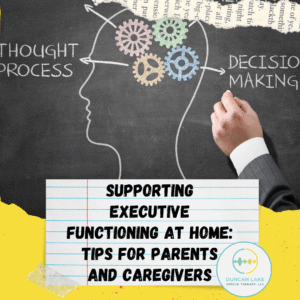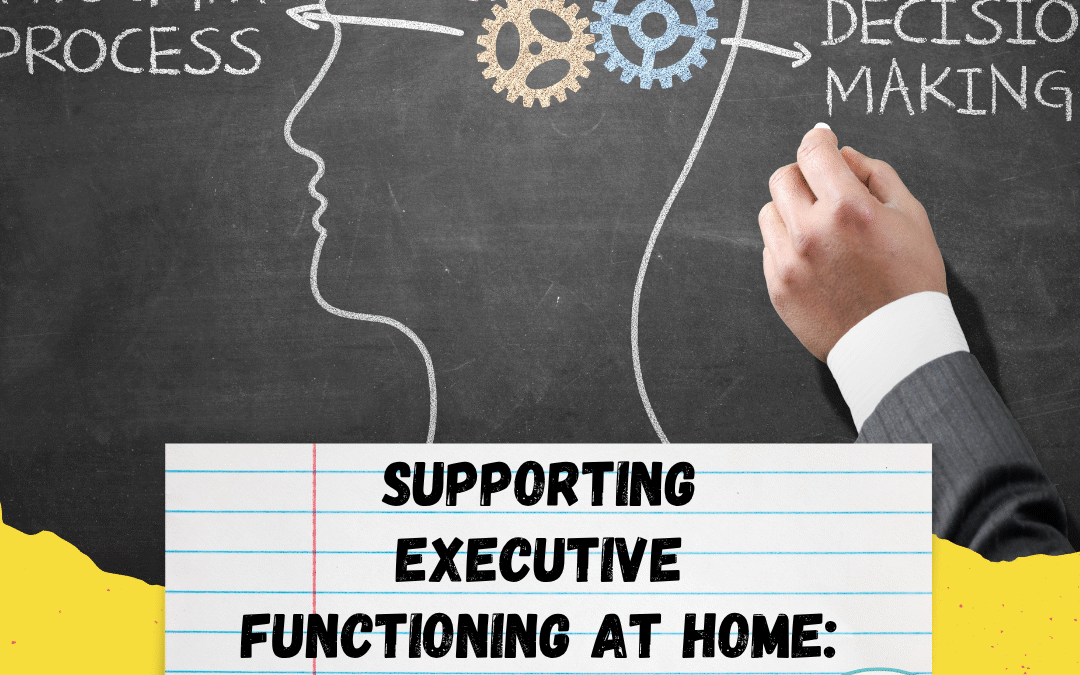by Tamiko Teshima, M.A., CCC-SLP
Practice Owner and Speech-Language Pathologist
Duncan Lake Speech Therapy, LLC
Executive functioning might sound like something from a boardroom, but it’s actually a set of brain skills that help us all manage daily life. Planning, remembering directions, shifting between tasks, managing emotions are all executive functions. And for many kids, especially those who are neurodivergent, these skills take extra support and practice.
If your child has a hard time getting started on tasks, loses track of time, melts down when routines change, or struggles with transitions, executive functioning challenges might be part of the picture.
The good news? These aren’t character flaws, and they aren’t signs of laziness or disobedience. They’re skills! And like any other skill, they can be supported and strengthened, especially at home.
What executive functioning challenges look like
Executive functioning difficulties don’t always wave a big red flag. Often, they look like everyday frustrations like taking forever to get out the door, needing constant reminders, or falling apart when something unexpected happens.
A child who “won’t” clean their room might actually feel overwhelmed by where to start. A teen who “won’t” do their homework might be stuck on how to begin. A kid who screams when it’s time to leave the park might not know how to shift from one activity to the next.
What’s really happening is that the brain is hitting some bumps in its ability to manage time, switch gears, regulate emotion, or follow multi-step directions.

How caregivers can help
At Duncan Lake Speech Therapy, we talk a lot about meeting kids where they are. And when it comes to executive functioning, that means recognizing which parts of the day are consistently tricky and offering scaffolding, not shame.
That might look like:
- Making routines visual and predictable. Many kids benefit from knowing exactly what to expect, and when. Posting a simple visual schedule or using a dry-erase board can turn the morning rush into a smoother, more independent process.
- Breaking big tasks into smaller ones. Telling your child to “get ready” might include ten different steps they have to organize and carry out on their own. Instead, try guiding them step by step: “First, find your shoes. Then, put them on.”
- Using external supports instead of relying on memory or willpower. That might be alarms, timers, sticky notes, or color-coded folders. These tools don’t mean your child is “dependent.” They’re just part of building a brain-friendly environment.
- Helping your child get unstuck without judgment. If they’re frozen, frustrated, or overwhelmed, start with connection: “This feels like a lot right now. I’m here to help you figure it out.”
- Giving extra support around transitions. Try giving a heads-up before it’s time to switch activities, and offer a sense of what comes next. “In five minutes, we’ll clean up and get ready for dinner. After dinner, you can pick the bedtime story.”
You’re not alone (and you’re not doing it wrong)
Parenting a child with executive functioning challenges can be exhausting, but it doesn’t mean you’re failing. It means your child’s brain processes the world in a way that requires more support, more flexibility, and often more creativity. You are allowed to use visual aids. You’re allowed to repeat yourself. You’re allowed to take shortcut
Supporting executive functioning isn’t about perfect systems. It’s about creating an environment where your child can build skills without shame. Where meltdowns are met with calm, not criticism. And where every small step forward is recognized for what it is: progress.
With time, the scaffolding you put in place now will help your child gain independence and confidence, not just at home, but in every part of life.



Recent Comments